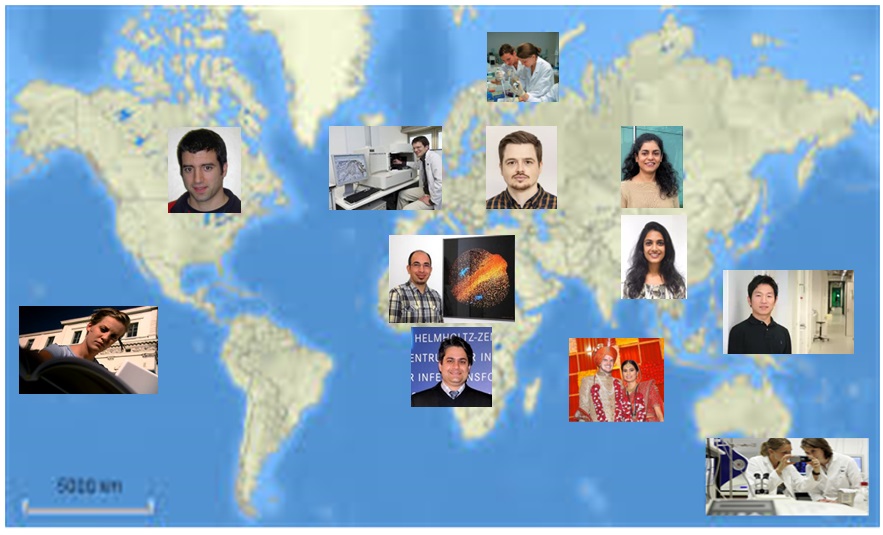„Systematic Endowment“
Adopting the motto "For a better future ..." MTZ®Foundation promotes science and research in the field of Human Medicine. The foundation supports the young generation of scientific talent and promotes their world class and cutting - edge work in biomedical stem cell and genetic research, which is in conformity with the highest bioethical standards. It promotes an interdisciplinary approach, that is, a conscious bringing together of traditional scientific approaches with medical Systems Biology.
The MTZ®Foundation – also with the help of the "Stifterverband für die Deutsche Wissenschaft" –supports prestigious universities and institutes by placing a MTZ®-Award in each institution. The ensemble of the extraordinary MTZ®-Awards consciously traces the interdisciplinary collaboration in top level cell and gene research. These awards stand within the logical row „in vivo, in vitro and in silico“. The awarded research approaches are mutually dependent and are thus part of a system.
Scientists from Germany with an international reputation help us to grant awards for research work of world class. The cooperation between the Federal Ministry of Education and Research (BMBF) and these internationally recognized researchers within the MTZ®-Panels provides a rigorous selection of the MTZ®-Awardees. It contributes to the fact that the MTZ®-Award is today nationally recognized as a national brand - the first important scientific prize for innovative research in the vita of the younger generation of promising scientific talent.
Thus, it reaches new dimensions in pathogenic research and drug development.
Scientists at the Max-Plank-Institute for Molecular Biomedicine in Münster are re-progamming cells to behave like embryonic stem-cells, developing the ability to form each of the more than 200 different cell types found in the human body. Generating these so-called Induced Pluripotent Stem cells (iPS) does not require the use of ovules or embryos.
The cutting-edge research approach of Medical Systems Biology especially opens new dimensions in the fight against cancer, when it comes to pathogenic research, drug development and new therapies.
The abundant data on individual cell components and functions, generated on different levels of life processes by means of the classical scientific research approach (“in vivo” and “in vitro”; genome, proteome, metabolome) is brought into a broader, more practical, and to some extent new coherence by Systems Biology’s use of computer-based modelling (“in silico”). The question to be answered is how complex biologic systems can operate by cross-linking their sub-processes. Only by this means can complex system characteristics, such as the regulation and control of biological systems and their system behavior, be understood and deciphered.
Medical practitioners, biologists, computer scientists working in bioinformatics and natural scientists from other fields collaborate across their disciplines. The function of the models obtained through their work is to facilitate the testing of hypotheses either experimentally or at the computer and thus to generate faster and more efficient research results. These simulations increasingly replace time-consuming laboratory experiments involving cell tissue and also enable predictions for further research activities possible.
„Funding with a systematic approach“– Promotion of the promising scientific young talents


The main focus of MTZ®Foundation in the future lies on individualised medicine and systems medicine. In this context Medical Systems Biology is the foundation for a medicine that responds to the individual needs of each patient. The way to a more personalized medicine will become more important in future funding.
Particularly in regard to preserving the quality of life of an increasingly aging society, problems of Bioethics will play an important role in the foundation’s work. It is of special concern to the MTZ®Foundation to determine to what extent modern cell and/or gene research already satisfies bioethical concerns and where possible limits to that research may be found. In this way, the foundation significantly contributes to the societal discussion of “a better future”. The MTZ®Foundation greatly appreciates the decision by the Albert-Ludwigs-University in Freiburg to declare ethics a mandatory subject in medical school, with a final examination on that topic (it is the only university in Germany that has done so). With the MTZ® Förderpreis 2007, a prize has been awarded in the field of applied bioethics for the first time in the 550 year history of the University of Freiburg. The MTZ®stiftung chose to make the award to a scientist at the University of Freiburg medical faculty in the hope that it will promote bioethical research in the field of molecular medicine.
"Many medical discoveries are the result of coincidence or observation: for example when doctors notice the same signs and symptoms of a disease in different patients and suddenly see a previously unrecognized connection. Such findings used to be disseminated separately and over long periods of time via medical journals. Today, new facts and findings are not only collected much faster and more efficiently but are also assessed in a broader context.
Digital technology enables us to collect and analyse increasing amounts of biomedical research data. It harbours considerable potential and is key to understanding the complex interaction of individual genetic factors and physiological aspects, lifestyles and environmental impacts in the development of diseases.
We want to use the opportunities offered by technological progress in the health sector to benefit the individual. With our medical informatics initiative, we are establishing the preconditions to enable different institutions to make use of the data generated by research and healthcare. That is what research for the people is all about: Clearly improving conditions for patients. At the same time, we also want medical research to benefit from a better data and knowledge base.
An interdisciplinary, holistic approach to research is needed to generate new findings from the data collected. That is precisely what systems medicine is about: By combining biology, medicine, physics, mathematics and informatics, systems medicine creates the foundation for enhancing diagnostics, treatments and disease prevention.
It is my pleasure to be the patron of the seventh international conference on systems biology of mammalian cells SBMC 2018 – with a focus on the potential of systems medicine. The promotion of young talent is a topic that is particularly dear to my heart and I am therefore especially delighted that under my patronage the conference is honouring three outstanding doctoral theses with the MTZ Award for Medical Systems Biology 2018."

Message of greeting for the 7th International Conference on Systems Biology of Mammalian Cells (SBMC 2018) of the Federal Minister of Education and Research Anja Karliczek MdB
Bildnachweis: Bundesregierung / Guido Bergmann (am Bild)

MTZ®-SBambassadress
Frau Netta Or
The young soprano
“Star of opera of the new generation”
"I have a great respect of the achievement of the young scientists. By way of Systems Biology they take the research in the cellular and genetic domain into a new dimension."
(Zitat vom 12.02.2008)
Germany is a country with much young research talents. The MTZ®Foundation aims to support these excellent talents and their potential to be outstanding in the field and seeks to make sure that they get the special attention and public recognition that they deserve. One function of the prize money is to enable the award recipients to continue their research work through postgraduate studies and complementary studies as well as internships abroad.
Your involvement
You can make a valuable financial contribution toward the development of the individual MTZ®-Awards. Beyond that, you can also support us in the allocation of travel grants to support research projects. The latter are not available through external funding but are of crucial importance to the international networking of junior scientists. We welcome contributions and donations. The concept of appropriated allotment is important to us. Please state which area of the foundation work you would like to support. We will do our best to take your wishes into account.






